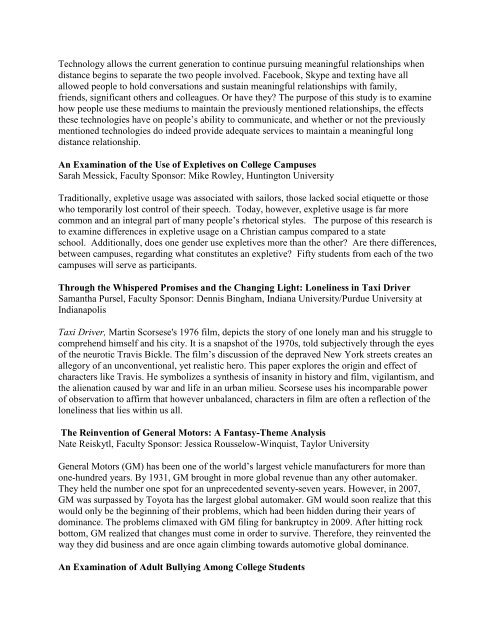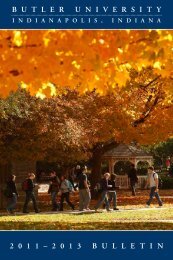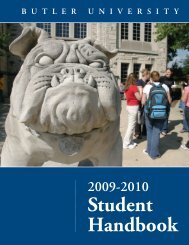Anthropology - Butler University
Anthropology - Butler University
Anthropology - Butler University
You also want an ePaper? Increase the reach of your titles
YUMPU automatically turns print PDFs into web optimized ePapers that Google loves.
Technology allows the current generation to continue pursuing meaningful relationships when<br />
distance begins to separate the two people involved. Facebook, Skype and texting have all<br />
allowed people to hold conversations and sustain meaningful relationships with family,<br />
friends, significant others and colleagues. Or have they? The purpose of this study is to examine<br />
how people use these mediums to maintain the previously mentioned relationships, the effects<br />
these technologies have on people’s ability to communicate, and whether or not the previously<br />
mentioned technologies do indeed provide adequate services to maintain a meaningful long<br />
distance relationship.<br />
An Examination of the Use of Expletives on College Campuses<br />
Sarah Messick, Faculty Sponsor: Mike Rowley, Huntington <strong>University</strong><br />
Traditionally, expletive usage was associated with sailors, those lacked social etiquette or those<br />
who temporarily lost control of their speech. Today, however, expletive usage is far more<br />
common and an integral part of many people’s rhetorical styles. The purpose of this research is<br />
to examine differences in expletive usage on a Christian campus compared to a state<br />
school. Additionally, does one gender use expletives more than the other? Are there differences,<br />
between campuses, regarding what constitutes an expletive? Fifty students from each of the two<br />
campuses will serve as participants.<br />
Through the Whispered Promises and the Changing Light: Loneliness in Taxi Driver<br />
Samantha Pursel, Faculty Sponsor: Dennis Bingham, Indiana <strong>University</strong>/Purdue <strong>University</strong> at<br />
Indianapolis<br />
Taxi Driver, Martin Scorsese's 1976 film, depicts the story of one lonely man and his struggle to<br />
comprehend himself and his city. It is a snapshot of the 1970s, told subjectively through the eyes<br />
of the neurotic Travis Bickle. The film’s discussion of the depraved New York streets creates an<br />
allegory of an unconventional, yet realistic hero. This paper explores the origin and effect of<br />
characters like Travis. He symbolizes a synthesis of insanity in history and film, vigilantism, and<br />
the alienation caused by war and life in an urban milieu. Scorsese uses his incomparable power<br />
of observation to affirm that however unbalanced, characters in film are often a reflection of the<br />
loneliness that lies within us all.<br />
The Reinvention of General Motors: A Fantasy-Theme Analysis<br />
Nate Reiskytl, Faculty Sponsor: Jessica Rousselow-Winquist, Taylor <strong>University</strong><br />
General Motors (GM) has been one of the world’s largest vehicle manufacturers for more than<br />
one-hundred years. By 1931, GM brought in more global revenue than any other automaker.<br />
They held the number one spot for an unprecedented seventy-seven years. However, in 2007,<br />
GM was surpassed by Toyota has the largest global automaker. GM would soon realize that this<br />
would only be the beginning of their problems, which had been hidden during their years of<br />
dominance. The problems climaxed with GM filing for bankruptcy in 2009. After hitting rock<br />
bottom, GM realized that changes must come in order to survive. Therefore, they reinvented the<br />
way they did business and are once again climbing towards automotive global dominance.<br />
An Examination of Adult Bullying Among College Students
















